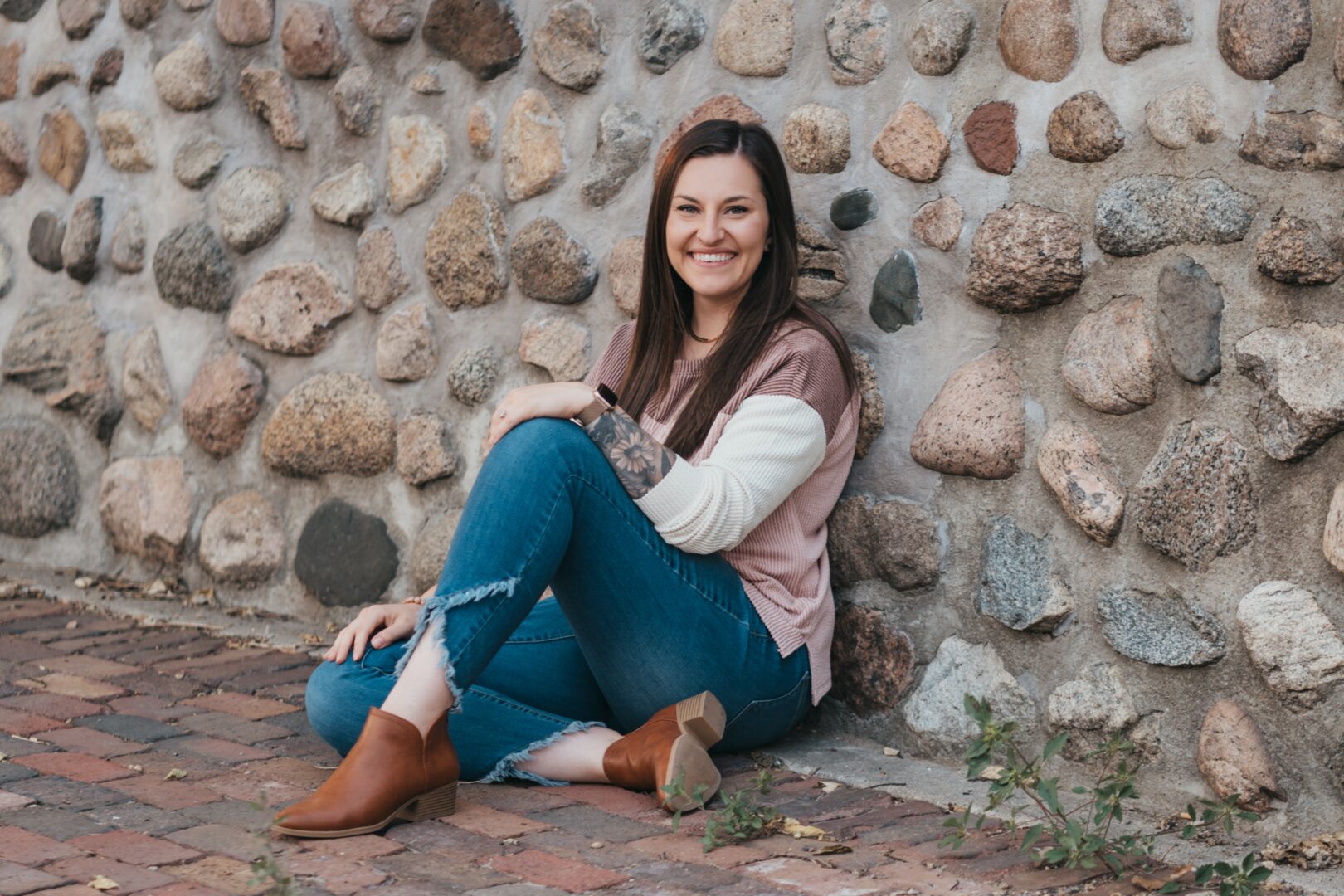We caught up with the brilliant and insightful Bethany Kroesing a few weeks ago and have shared our conversation below.
Bethany, thanks so much for taking the time to share your insights and lessons with us today. We’re particularly interested in hearing about how you became such a resilient person. Where do you get your resilience from?
My journey of resilience is one that is always being written. I believe that resiliency is a destination that we are always traveling toward – sometimes we are steadfast on our path and sometimes we might take a detour. As a mental health therapist specializing in anxiety and trauma, I am often asked about resilience—where it comes from and how you can cultivate it. This question is both deeply personal and universally relevant. I believe that resilience is not merely an abstract quality but a dynamic force that shapes our ability to withstand and grow from adversity. For me, resilience is rooted in a combination of overcoming past challenges, drawing inspiration from my clients’ healing journeys, and leaning on the unwavering support of my family.
My own journey toward resilience began with confronting my personal challenges. Every therapist has a story, and mine is no different. The decision to become a therapist was significantly influenced by my own experiences with anxiety and trauma and the transformative role that my own therapist has played in my journey. Having navigated these challenges with the guidance of a compassionate and skilled therapist (shout out to you, Heidi!), I developed a profound understanding of the healing process.
This personal experience was pivotal. My therapist helped me confront and work through my own struggles, providing me with the tools and insights necessary to be my authentic self. This journey of healing was not just about overcoming difficulties but also about gaining a greater perspective on life and the therapeutic process. The lessons learned from my own experiences have deeply informed how I approach my work with clients. They have shaped my empathy, understanding, and the strategies I use with my own clients.
Navigating these personal challenges —whether it was healing from trauma, managing the demands of starting a private practice, or navigating the balance of being a mom and a business owner was not easy. Yet, each obstacle offered valuable lessons about perseverance, adaptability, and self-compassion. By reflecting on these experiences, I developed a sense of inner strength and resilience that has become the bedrock of my professional and personal life. My past challenges have not only forged my resilience but have also equipped me with a unique perspective that enhances my ability to support and guide my clients.
As I embarked on my journey as a trauma and anxiety therapist and opened my private practice, I discovered another profound source of resilience: the remarkable healing journeys of my clients. Witnessing the courage and strength that my clients have is a constant reminder of the human spirit’s capacity for growth and transformation. Sometimes I have to pause and reflect on just how lucky I am to witness the remarkable journeys my clients go through. It’s a constant reminder that there is beauty even in the most difficult moments.
Every client’s story is unique, and each one presents a new perspective on resilience. Whether it’s a person overcoming the effects of trauma or learning to manage panic and anxiety, the progress they make serves as a powerful source of inspiration. Their resilience in the face of adversity fuels my own motivation and reinforces my commitment to helping others navigate their struggles. Therapy is truly transformative and doing this work constantly reminds me of the inner strength we all possess.
Finally, the resilience I have developed is deeply intertwined with the support of my loving family. I wouldn’t be the person I am today without both the family I came from and the family I’ve created. Resilience is not a solitary endeavor; it is often bolstered by the relationships and support systems that surround us. My family has been a pillar of strength, providing encouragement, understanding, and unconditional love throughout my journey.
During challenging times, my family’s unwavering support has been a source of safety and reassurance. Their belief in my abilities and their constant presence have been instrumental in helping me navigate the ups and downs of life. Their support not only offers emotional comfort but also practical assistance, allowing me to focus on showing up as the most authentic version of me. This reinforces my own resilience, highlighting the importance of nurturing supportive relationships in both personal and professional contexts.


Thanks for sharing that. So, before we get any further into our conversation, can you tell our readers a bit about yourself and what you’re working on?
I lead a busy but mostly balanced life, and I’m learning to find beauty in the midst of my organized chaos. My work is incredibly inspiring, and I’m passionate about what I do. I’m always looking for ways to further myself in the therapy field so I can provide cutting edge services to my clients. Because of this, I have advanced training in a method called Accelerated Resolution Therapy. I love this therapy because it is fast, effective, and gentle. My clients love this therapy because they are able to work through their problems quickly and creatively. This is by far the best investment I’ve made in myself and my practice.
Accelerated Resolution Therapy (ART) is a unique approach to resolving mental health concerns because it focuses on three primary things: the negative images a client has when they think of their problems, the distressing emotions that are tied into the imagery, and the unpleasant body sensations that show up as a result. Clients are able to resolve their problems much quicker in Accelerated Resolution Therapy than they can in talk therapy alone, because ART harnesses the power of eye movements. The eye movements are calming and produce theta waves in the brain. Theta waves are known to be connected with creativity, intuition, and meditation. This is also why clients are able to resolve their problems so quickly – sometimes in as little as one to five sessions!


There is so much advice out there about all the different skills and qualities folks need to develop in order to succeed in today’s highly competitive environment and often it can feel overwhelming. So, if we had to break it down to just the three that matter most, which three skills or qualities would you focus on?
Reflecting on my journey, three pivotal qualities stand out as having been instrumental to my growth and success. Each of these attributes has shaped not only how I approach challenges but also how I’ve navigated the inevitable twists and turns along the way. Here’s a deeper dive into these qualities, along with practical advice for those who are just beginning their own journeys.
1. The Ability to Ask for Help
One of the most crucial lessons I’ve learned is the value of asking for help rather than trying to reinvent the wheel on my own. Early on, I had the misconception that self-reliance meant doing everything by myself. It wasn’t until I began seeking guidance and support from others that I truly started to make meaningful progress.
Advice for Beginners: Don’t be afraid to reach out and ask for help. Whether it’s a mentor, a colleague, or even a peer in the industry, leveraging the knowledge and experience of others can save you time and offer new perspectives. Build a network of supportive individuals who can provide advice, share resources, and offer constructive feedback. Remember, asking for help is not a sign of weakness but a strategic move toward achieving your goals more efficiently.
2. The Ability to “Do It Scared”
Another essential quality is the courage to act despite feeling apprehensive or uncertain. Often, the fear of failure or making mistakes can paralyze us, causing us to miss out on valuable opportunities. Embracing the mindset of “doing it scared” means acknowledging your fears but choosing to move forward regardless.
Advice for Beginners: Embrace discomfort as part of the growth process. It’s natural to feel fear when stepping into the unknown, but don’t let that fear prevent you from taking action. Start with small steps outside your comfort zone and gradually build your confidence. Each time you take action despite your fears, you’ll gain valuable experience and resilience, which will strengthen your ability to tackle bigger challenges in the future.
3. The Ability to Adapt
Lastly, the ability to adapt when your current path isn’t yielding the results you hoped for has been a game-changer. I’ve learned that recognizing when a change is needed and being flexible in my approach is not a sign of failure but an opportunity for growth and evolution.
Advice for Beginners: Stay open to the possibility of pivoting when necessary. Not every plan or strategy will work out as anticipated, and that’s okay. Be willing to reassess your goals, seek feedback, and adjust your approach based on what you’ve learned. Flexibility allows you to respond to new information and changing circumstances, turning potential setbacks into chances for innovation and improvement.


We’ve all got limited resources, time, energy, focus etc – so if you had to choose between going all in on your strengths or working on areas where you aren’t as strong, what would you choose?
I think it’s a bit of both. There’s definitely value in doubling down on your strengths because that’s where you can bring the most value and experience the most satisfaction. But at the same time, being well-rounded is important because it helps you navigate the challenges and uncertainties that come with growth.
For example, I’ve always considered myself adaptable, which has been a huge asset in both my personal and professional life. Being adaptable means I can adjust to new situations, handle change without being overwhelmed, and keep learning from experiences. But I’ve also struggled with pivoting when I feel like I’ve “failed” or when something hasn’t worked out as planned. I find myself wrestling with that feeling of disappointment and sometimes even questioning if I should just give up on a goal altogether. That’s where my adaptability comes in—I can use it to give myself some grace. I remind myself that trying something and not succeeding doesn’t mean I’ve failed. It just means I’ve learned something new and can take that lesson into the next attempt.
On the other hand, if I only focus on my strengths, I might miss opportunities to become more well-rounded. For instance, early in my career, I was good at a few things—problem solving, creative thinking, and communication—but I wasn’t as skilled in marketing, bookkeeping, and creating business plans. I realized that if I didn’t invest time in improving those areas, I might limit my growth and future opportunities. So, I started taking courses and seeking mentorship in those areas. It wasn’t easy, and there were times when it felt overwhelming, but the effort paid off because it made me more adaptable and more confident in my abilities. At the end of the day, no amount of mentorship could help me with bookkeeping. So (no surprise to my high school math teacher), sometimes you just need to hire out and call it a day on things like that!
Ultimately, I think the key is balance. You can always improve in areas of weakness, but you don’t want to dilute your strengths. At the same time, investing in areas where you’re less strong can open up new opportunities and make you more adaptable, just like in my own experience. I’ve learned that it’s not about choosing one path over the other—it’s about using your strengths to support your growth and being open to improving where you need to. And that takes time, patience, and self-compassion.
Contact Info:
- Website: https://www.cedarandivycounseling.org
- Facebook: https://www.facebook.com/cedarandivycounseling/


Image Credits
Image credits: Kylie Engelby at Marigold Mood
so if you or someone you know deserves recognition please let us know here.




